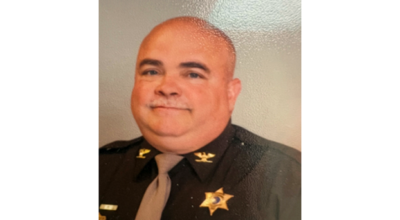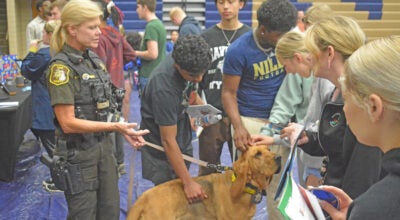School ‘family’ recalls memories
Published 9:31 am Tuesday, August 4, 2009

Former students of the one-room rural schoolhouses of the Niles-Buchanan area gathered at the Buchanan Senior Citizens Center this past Saturday to reminisce during their annual luncheon. Back row from left: Joe Benak, Patsy Benak Boyle, Mike Craw, Elaine Siewert, Don Holmes, James Hemminger, Fred Moore and Sam Craw. Front row from left: Karen Carlson Pastore, Sandy Nichols Taylor, Pat Hemminger, Joyce Ferris, Stella Proud, and Ruth Rose. (Daily Star photo/KATHIE HEMPEL)
By KATHIE HEMPEL
Niles Daily Star
Their numbers were fewer this year.
The first Saturday of August each year for 23 years, students of Buchanan Township’s former one-room rural schoolhouses, gather to reminisce over their childhood school days.
These are the folk who did walk miles to school in deep snow, stoked the coals and gathered the wood to heat the room where they would learn their ABCs and 123s.
Stella Proud of Buchanan has been chairing the event for the past 14 years. Her current battle against cancer could not keep her from continuing.
“We’ve many who are now ill and won’t be able to attend, but this yearly get-together is something I just can’t miss,” she said.
At one time the event was held at the Buchanan Middle School and one year 125 former students gathered to share their memories. However this year saw only 14 students, some with their spouses, attend the potluck luncheon held at the Senior Citizen’s Center in Buchanan.
A card was signed by all for Ruth Rose who will celebrate her 98th birthday this week.
Her most vivid memory is the year she started school.
“My teacher, Ruth Herman, her son came in to say the bitter goodbye as he headed off to war. He never returned,” she said.
Others remember Mrs. Beardsley who was the travelling music teacher. She would help the students by having concerts to raise funds for school trips. Joyce Ferris recalled being the Scarecrow in a production of The Wizard of Oz.
“I was the strawman who wished I had a brain,” Ferris said.
Many high school principals of the day would often comment on their preference of the rural school children as students. These kids knew how to work. Many often combined their studies with many hours of work out on the family farm or helping to raise younger siblings.
Pat Hemminger believes that part of the reason they retained their lessons so well was repetition.
“By the time you finished your years in the one-room schoolhouse, you had heard the lessons repeated several times even if some of it was almost subconsciously as you studied your own lesson, but could still hear the teacher teaching another class,” Hemminger said.
The group laughed as they recalled recess games such as Mother May I, spelling and math bees (without calculators), phonics charts and memory work. They remember walking to school with cardboard inserted in worn shoes because there wasn’t any money to buy new ones.
“We didn’t know we were poor,” Proud said. “We were happy and thought we were rich in so many ways.”
Rose remembers every teacher she ever had but one. There is a deep respect for teachers in this bunch.
Memories of Mrs. Andrews, who drew a circle on the board and made you put your nose in it and stand there if you were bad, now draw gales of laughter not threats. Don Holmes remembers Orpha Andrews as his teacher for seven of his nine years attending Broceus School. He proudly displayed a picture taken many years later with his mentor whom he visited at Brentwood Nursing Home until she passed away.
He also recalls boys going down into the cellar below the heat grate and trying to look under the girls’ skirts. He quickly assures the ladies of the luncheon that he was not one of those boys.
His old school mate Fred Moore sitting across from him now at the senior center backs up both his claim that the deed was done and that Holmes himself was not the kind of boy to participate in such shenanigans.
The friendships formed in those early days are still obviously cherished. “We were family,” Hemminger said as a matter of fact.
This family agrees while computers and the instant onslaught of news from around the world can have its benefit, something precious has been lost. Though they walked miles, they appreciate the fact they could walk to school and are sad that it is not always safe for young children to do that today.
They mourn the lack of respect for teachers once revered and for the teachers themselves who today have to teach so very much more than the teachers of their day with far more restrictions. There has been so much change in the fields of science and medicine, geography and the wars they lived through are now in the history books.
But it is the good times they mostly remember: gathering paw paws and milkweed pods, used to stuff military life jackets; the box socials, where boys watched to bid on lunch with their favorite lady; inoculations by a young Dr. John Strayer of Niles completing a project for medical school and the Little Golden Song Book, from which they all learned hymns, patriotic songs and the Gettysburg Address.
Four generations of Rose’s family went to Mead School at the corner of Rangeline and Geyer Road. The families formed in those one-room schoolhouses, however, are just as important to this group as their own.
Many of the school buildings are gone now. Their names were Bakertown, Broceus, Cedar Lane, Colvin, Coveney, Currier, Dayton, Dutch Corner, Gardner, Geyer, Holmes, Howe, Kansas, Kelsey (Lake Chapin), Mead, Miller, Oak Forrest (Pollywog), Raneline/DeMOTT, Womer and Wagner.
As they get ready to say goodbye for another year, even though many are still dear friends and see each other often, they agree that it is important to continue the annual luncheon. It is important to remember both the good times and the hardships.
“There’s one thing nobody has mentioned yet,” Hemminger said. “Those two little buildings out back.”
All laugh at the mutual image of the old outhouses.
“I remember one year my Uncle Richard, then principal, waited for those who might indulge in the annual Halloween prank of tipping over the outhouses. He heard them coming and shot his gun into the air. He said he laughed until he could barely stand it was so funny watching them run away.”
Kay Wile Craw, one of the town school kids whose husband went to Miller School, brought a couple of binders in which she has been gathering and preserving the schools history. Old report cards, photos (or copies), news paper articles, texts: if you have any artifacts from any of the rural schools mentioned, she wants them to add to the collection housed at the Buchanan Library.
“We are in danger of losing all these memories. They need to be preserved,” Craw said.
She asks that those having any of the precious memories to contact her at (269) 471-1989.
Memories and history are made of these.






